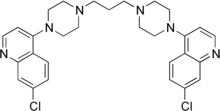Piperaquine
 |
|
| Clinical data | |
|---|---|
| ATC code |
P01BF05 (WHO) (combination with artenimol), P01BX02 (WHO) (combination with arterolane) |
| Identifiers | |
|
|
| CAS Number |
4085-31-8 |
| PubChem (CID) | 122262 |
| ChemSpider |
109031 |
| UNII |
A0HV2Q956Y |
| ChEBI |
CHEBI:91231 |
| ChEMBL |
CHEMBL303933 |
| Chemical and physical data | |
| Formula | C29H32Cl2N6 |
| Molar mass | 535.51 g/mol |
| 3D model (Jmol) | Interactive image |
|
|
|
|
|
|
|
Piperaquine is an antimalarial drug, a bisquinoline first synthesised in the 1960s, and used extensively in China and Indochina as prophylaxis and treatment during the next 20 years. Usage declined in the 1980s as piperaquine-resistant strains of P. falciparum arose and artemisinin-based antimalarials became available. However, Chinese scientists have been studying whether piperaquine can still be used therapeutically in combination with artemisinin.
Piperaquine is characterized by slow absorption and a long biological half-life, making it a good partner drug with artemisinin derivatives which are fast acting but have a short biological half-life.
The fixed-dose combination dihydroartemisinin-piperaquine (Eurartesim) was submitted for approval to the European Medicines Agency in 2009.
...
Wikipedia
